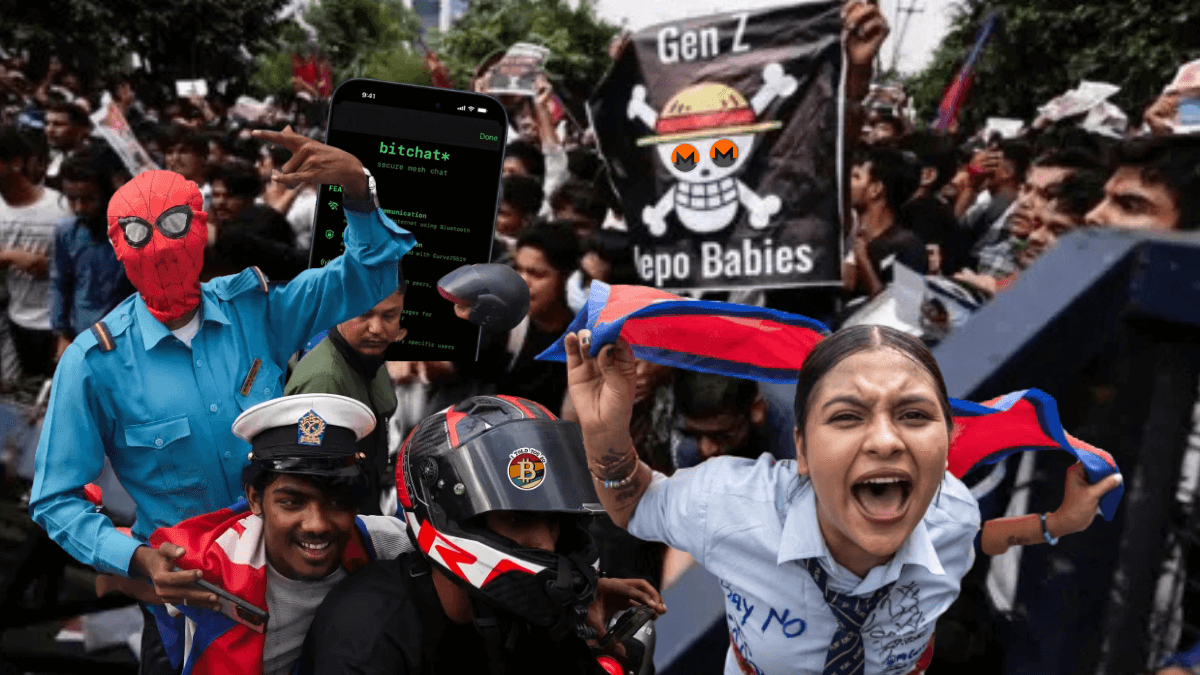When Governments Cut the Wires, Freedom Tech Becomes a Lifeline
The pattern is becoming impossible to ignore. When governments face protests, their first instinct is to cut communication channels. Ban social media. Shut down the internet. Control the narrative by controlling the pipes. But protesters are adapting faster than authoritarian playbooks can keep up.

Nepal's government just banned every major social media platform during Gen Z anti-corruption protests. Facebook, WhatsApp, Twitter, Instagram, even WeChat, all blocked in a desperate attempt to stop protesters from organizing.
The response was immediate and telling. While traditional platforms went dark, Bitchat downloads exploded. The decentralized mesh messaging app, developed by Jack Dorsey and Calle, saw people join their Nepal geohash channel as protesters scrambled for alternatives.
Last week, we observed a sudden spike in bitchat downloads from Indonesia during nationwide protests.
— calle (@callebtc) September 10, 2025
Today we're seeing an even bigger spike from Nepal during youth protests over government corruption and a social media ban.
Freedom tech is for the people. Please share. pic.twitter.com/IqhRa8eCvw
The data tells the story governments don't want you to see. Bitchat's Nepal usage jumped from essentially zero to 48,781 users on September 8th, making it the second-largest country by downloads overnight. When people need to communicate and traditional platforms fail them, they find alternatives.
The Nepal spike wasn't an isolated incident. Indonesia experienced similar government overreach, triggering another wave of freedom tech adoption. As protests erupted over corruption and social media restrictions, Bitchat downloads surged there too.
Reddit users in Nepal were openly recommending Bitchat: "Called bitchat, uses bluetooth instead. Perfect for situation like tomorrow. Available in android too." Another user confirmed: "Bitchat works without internet. It's Bluetooth mesh-based messaging app. In case our gov decides to block more services."
The technical advantage is crucial. When governments shut down internet infrastructure entirely, Bitchat's Bluetooth mesh networks still function. Messages hop from device to device, creating local networks that exist independently of any centralized infrastructure.
This isn't the first time we've seen freedom tech surge during protests. Session App experienced massive adoption during Iran's protests when the government blocked WhatsApp and other mainstream platforms.
But Session still requires internet connectivity. Bitchat's mesh networking capability represents an evolution in protest technology, one that works even when governments flip the kill switch on internet access entirely.
The difference matters. In disaster zones, remote areas, or under complete government digital blackouts, mesh networks provide the only reliable communication option.
Why Mesh Networks Matter
Traditional messaging apps depend on centralized servers and internet infrastructure. Cut the cables, block the servers, and communication stops. Mesh networks flip this dependency on its head.
Each device becomes a node in the network. The more people using the system, the stronger and more resilient it becomes. Governments can't shut down a network that exists in the phones of the protesters themselves.
This represents a fundamental shift in the balance of power between states and citizens. For the first time in history, people have access to communication tools that governments simply cannot disable without physically confiscating every device.
Jack Dorsey's Redemption Arc
Dorsey's involvement adds complexity to the freedom tech narrative. His record at Twitter was problematic for free speech advocates, with numerous instances of censorship and platform manipulation that undermined open dialogue.
But his post-Twitter work tells a different story. Through Block Inc. and projects like Bitchat, Dorsey is building genuinely decentralized infrastructure that no single entity can control, including himself.
The technology speaks louder than past platform policies. Bitchat is designed to be censorship-resistant by nature, not by corporate policy. There's no central authority that can flip a switch and silence users.
The Authoritarian Response Cycle
Governments follow a predictable playbook when facing protests:
- Restrict traditional social media
- Throttle internet speeds
- Implement complete blackouts if necessary
- Control information flow through state media
What they haven't adapted to is the rise of mesh networking and other freedom technologies that operate outside their control infrastructure.
The Nepal and Indonesia cases demonstrate that this cycle is breaking down. When governments restrict communication, protesters don't go silent, they migrate to platforms that can't be restricted.
Freedom Tech vs. Big Tech
The distinction matters. When governments pressure companies like Meta or X to censor content, those companies often comply. They have shareholders, offices, and business interests that make them vulnerable to state pressure.
Mesh networks as with decentralized networks have no CEOs to arrest, no headquarters to raid, no servers to seize. They exist as pure protocol, implemented across thousands of devices that governments cannot simultaneously control.
This represents the maturation of truly decentralized technology. Not "decentralized" in the blockchain marketing sense, but actually distributed systems with no central points of failure or control.
The Broader Implications
The freedom tech surge during recent protests signals a permanent shift in how information moves during crises. People now have tools that governments fundamentally cannot shut down without resorting to physical force against individual device owners.
This changes the calculus for authoritarian regimes. Traditional information control strategies become less effective when communication networks can exist independently of state-controlled infrastructure.
For protesters, it means organizing capabilities that previous generations couldn't imagine. Real-time coordination without relying on any infrastructure that governments can disable.
What Comes Next
The Nepal and Indonesia experiences provide a roadmap for future protest movements. When governments restrict communication, people immediately seek alternatives. Those alternatives are becoming increasingly sophisticated and harder to suppress.
Expect to see continued innovation in mesh networking, satellite communication, and other technologies that operate outside traditional internet infrastructure. The arms race between state control and individual freedom is accelerating, with technology clearly favoring decentralization.
Based on recent evidence, people are adapting faster than governments. And that might be the most important technological development of our time.
Freedom tech isn't just for protesters. It's infrastructure for anyone who believes communication should remain possible regardless of who controls the traditional pipes. In an increasingly unstable world, that's becoming everyone.







